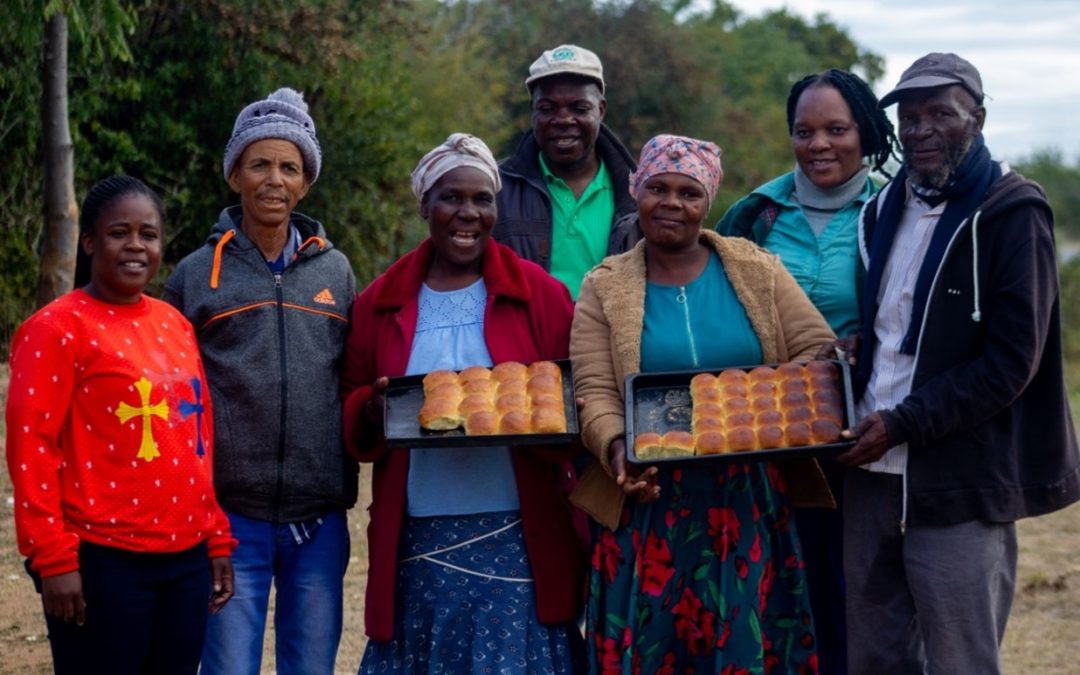By Nyarai Chisorochengwe, Shylet Tsekenedza, Eileen Nchanji, Patricia Onyango, Owen Kimani
Lime is a registered group of 17 members comprising seven couples, one widow and two young women based in Chimanimani district in Manicaland province. Their vision is to produce beans, bean seeds and bean-based products to sell to reputable shops in and out of the community. They registered their company to become visible to seed companies so they could get into contract farming which they are now doing.
In 2018/2019, this group was introduced to the Pan Africa Bean Research Alliance and the TAAT Bean Compact project. They received 5kg each of improved micronutrient-rich bean varieties, NUA45 and Sweet violet (that is, 10kg seed valued at US$ 250). They divided the seed amongst themselves, with each member getting 1 kg of each variety. The production area under these micronutrient-rich bean varieties was 0.2 ha (0.1ha Sweet Violet, 0.1ha NUA45), with average yields being 1300kg/ha and 1400kg/ha for NUA45 and Sweet Violet, respectively. This represents an average 25 percent increase in yield when using improved varieties (in contrast to productivity using local varieties, which was less than 1000kg/ha). Each participating farmer realized an average net income of US $ 23 from I kg of bean planted. Each member realized at least a dollar for every dollar invested during the 2018/2019 season.
The contribution by the PABRA project (i.e., seed) amounts to 67 percent of the total investment during the production season. About 50% of the total production was sold, with the remainder allocated for household consumption (an estimated 24 percent) and seed for the next season (around 26 percent).
Financial assistance was gotten through Old Mutual at affordable rates. With the loan, they have created a profitable enterprise by processing biofortified NUA45 into value-added by-products such as buns, scones, and porridge. On top of this, they want to construct lodges and shops to promote their business. They operate in a central place allocated to them by the village head, who is also a group member.
The group has contracts with clinics for supplying nutritious products, but they do not have enough capital to kick start the project on a large scale. The group members have some experience in training other farmer groups on making bean products. Besides being couples in the same group, the members have no challenges attending meetings, making decisions on what to grow, where to sell and what to do with the money since their counterparts are also involved in the project. Each household has an oven where they bake for the family then the group has a bakery where they sell to the surrounding community.
Mr and Mrs Chizemo, one of the couples in this group, have five children, four of whom are of school-going ages. They all assist their parents in bean production and bread manufacturing. The couple intends to employ some members of the community if their business flourishes. They have also managed to buy goats using the proceeds from beans and intend to purchase a car that will deliver their buns to different shops across the district.
The village head, who is also a group member, said that the trees in his area are conserved because of the short cooking time of NUA45. The group members, after receiving business skill training, have improved their price negotiating skills with their partners. With the income earned, they have increased their production area and yield. Their decision-making powers on-farm and in the household have improved as women and youths now decide on what happens on the farm, markets and income from bean sales. Also, their children now have improved health and better cognitive development.
The chairlady said the group intends to buy cars for each member from the proceeds from the bakery as well as from producing NUA 45.


